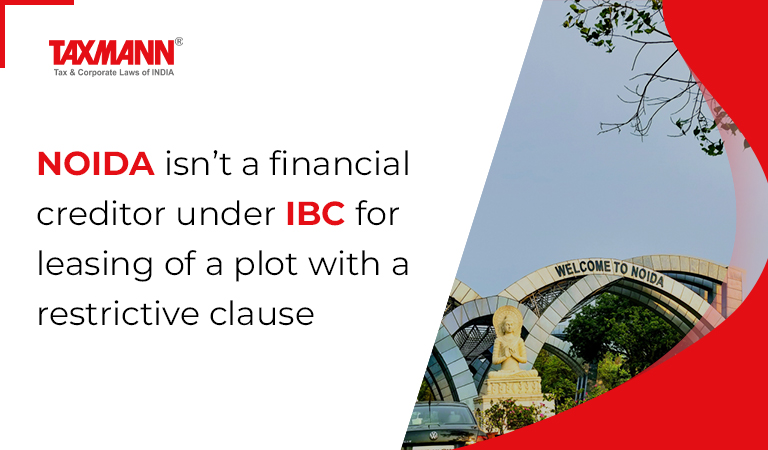NOIDA isn’t a financial creditor under IBC for leasing of a plot with a restrictive clause
- Blog|News|Insolvency and Bankruptcy Code|
- 2 Min Read
- By Taxmann
- |
- Last Updated on 19 May, 2022

Case Details: New Okhla Industrial Development Authority v. Anand Sonbhadra - [2022] 138 taxmann.com 293 (SC)
Judiciary and Counsel Details
-
- K.M. Joseph & Hrishikesh Roy, JJ.
Facts of the Case
In this landmark ruling, the Apex Court held that NOIDA isn’t a financial creditor under IBC as leasing of a plot with a restrictive clause didn’t amount to finance lease
The appellant ‘NOIDA’ initially submitted Form ’B’ and claimed as an operational creditor in regard to the dues outstanding under the lease. Subsequently, the appellant filed a claim in Form ‘C’ and claimed as a financial creditor. There was some correspondence that revealed that the appellant insisted upon being treated as a financial creditor.
Finally, the matter was considered by the adjudicating authority (NCLT) which held that there was no financial lease in terms of the Indian Accounting Standards and there was no financial debt. By the impugned order, NCLAT has affirmed the view taken by the NCLT.
The question that arose for consideration before the Court was whether the appellant is entitled to be treated as a financial creditor within the meaning of the IBC?
Supreme Court Held
On appeal, the Apex Court observed that where NOIDA leased out a plot of land for 90 years with clause that lessee builder will construct residential buildings on it within maximum of 7 years with extension to be allowed for maximum 3 more years with penalty and if lease cancelled due to non-fulfilment of conditions the land with any building on it to revert to NOIDA and requirement of prior permission of NOIDA to create mortgage over it, it was clear that lessee builder does not get substantial risks and rewards of ownership as he is not free to do whatever he likes with the plot of land. Therefore, the lease does not qualify as financial or capital lease under section 5(8)(d) read with Paras 61 to 67 of Ind AS 116 and will not qualify as “financial debt”.
“A lease, which is not a finance or a capital lease under Section 5(8)(d), may create a financial debt within the meaning of Section 5(8)(f),if, on its terms, the Court concludes that it is a transaction, under which, any amount is raised, having the commercial effect of the borrowing. The lease in question does not fall within the ambit of Section 5(8)(f) as lessee has not raised any amount from the appellant under the lease, which is a transaction. The raising of the amount, which, according to the appellant, constitutes the financial debt, has not taken place in the form of any flow of funds from the appellant/lessor, in any manner, to the lessee. The mere permission or facility of moratorium, followed by staggered payment in easy installments, cannot lead us to the conclusion that any amount has been raised, under the lease, from the appellant, which is the most important consideration.” Said Supreme Court
In view of the above the Court held that NOIDA is not a ‘financial creditor’ and is an ‘operational creditor’ under the provisions of IBC, 2016
Disclaimer: The content/information published on the website is only for general information of the user and shall not be construed as legal advice. While the Taxmann has exercised reasonable efforts to ensure the veracity of information/content published, Taxmann shall be under no liability in any manner whatsoever for incorrect information, if any.

Taxmann Publications has a dedicated in-house Research & Editorial Team. This team consists of a team of Chartered Accountants, Company Secretaries, and Lawyers. This team works under the guidance and supervision of editor-in-chief Mr Rakesh Bhargava.
The Research and Editorial Team is responsible for developing reliable and accurate content for the readers. The team follows the six-sigma approach to achieve the benchmark of zero error in its publications and research platforms. The team ensures that the following publication guidelines are thoroughly followed while developing the content:
- The statutory material is obtained only from the authorized and reliable sources
- All the latest developments in the judicial and legislative fields are covered
- Prepare the analytical write-ups on current, controversial, and important issues to help the readers to understand the concept and its implications
- Every content published by Taxmann is complete, accurate and lucid
- All evidence-based statements are supported with proper reference to Section, Circular No., Notification No. or citations
- The golden rules of grammar, style and consistency are thoroughly followed
- Font and size that’s easy to read and remain consistent across all imprint and digital publications are applied



 CA | CS | CMA
CA | CS | CMA
